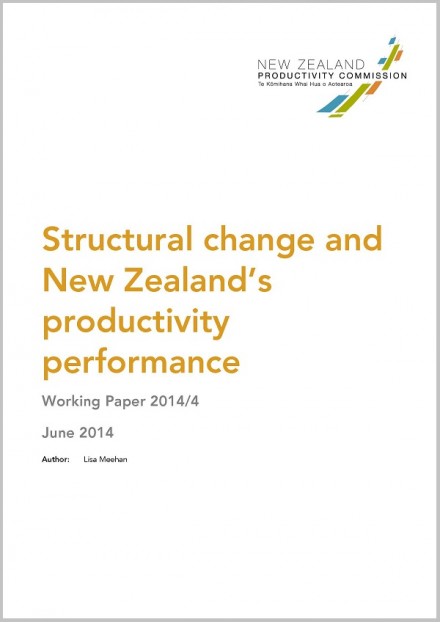Structural change and New Zealand’s productivity performance

5 June 2014
As requested in the Terms of Reference for the services inquiry, this Working Paper reports research on the extent to which employment has shifted from high to low productivity industries in New Zealand. Although within-industry growth is the most important component of aggregate productivity growth, the impact of employment shifts across industries is negative and relatively large in New Zealand compared to other OECD countries.
Abstract
Shift-share analysis decomposes aggregate labour productivity growth into a contribution from within-industry productivity growth and a contribution from employment movements across industries with differing labour productivity levels. Because the role that structural change plays in productivity growth differs with the level of a country’s economic development, this paper focuses on New Zealand in comparison with other OECD countries.
New Zealand’s economy-wide labour productivity growth has been lower than most other OECD countries. As in all other OECD countries examined in this paper, the majority of New Zealand’s labour productivity growth since the early 1990s has come from within-industry productivity growth. Like most other OECD countries, New Zealand has experienced productivity-detracting structural change with employment moving towards industries with below-average levels of labour productivity. In aggregate, New Zealand’s poor labour productivity growth compared with other OECD countries reflects both below-average performance of its within-industry productivity growth and a larger employment shifting towards low-productivity industries. Although the structural change component is a relatively smaller part of overall labour productivity growth, New Zealand’s structural change effect was further behind the OECD average structural change effect than its within-industry productivity growth.
New Zealand’s comparatively large negative structural change was due to small differences in employment share changes and relative labour productivity levels in a few industries. Industries that were undergoing significant reforms during the 1990s were the main culprits, with larger employment movements away from high labour productivity industries such as electricity, gas & water and transport, storage & communications in New Zealand than other OECD countries.
These differences highlight some of the limitations of shift-share analysis that may be particularly acute during times of reform. For example, the assumption that the average and marginal productivity in an industry are equivalent may result in an overestimation of the negative contribution of structural change.
As a small open economy, New Zealand could, in principle, increase output in high-productivity industries through exporting. In practice, New Zealand’s propensity to export is low compared with other small, open economies and this export-led employment shift has not occurred.
The shift-share analysis presented in this paper is a first step in understanding the role of resource reallocation in productivity growth in New Zealand. In interpreting the results of this paper it is important to note that shift-share analysis is a descriptive tool to look at high-level structural change. Taken in isolation, it does not provide information on the drivers and dynamics of resource reallocation, nor does it necessarily indicate the mis-allocation of resources. Firm-level data offers the opportunity to explore these issues further.
Publications
Filter publications by topic.
23 February 2024
20 February 2024
20 February 2024
20 February 2024
20 February 2024
13 February 2024
31 January 2024
14 November 2023
31 October 2023
17 October 2023
31 July 2023
3 July 2023
30 June 2023
30 June 2023
20 June 2023
1 May 2023
30 March 2023
28 February 2023
28 February 2023
27 February 2023
27 February 2023
20 February 2023
23 December 2022
21 December 2022
15 November 2022
29 September 2022
1 September 2022
18 July 2022
30 June 2022
9 June 2022
31 May 2022
28 May 2022
28 May 2022
1 April 2022
15 December 2021
1 December 2021
14 November 2021
8 November 2021
8 November 2021
8 November 2021
8 November 2021
27 September 2021
1 September 2021
19 July 2021
1 July 2021
27 May 2021
21 April 2021
21 April 2021
20 April 2021
20 April 2021
1 April 2021
25 February 2021
14 December 2020
4 December 2020
30 November 2020
4 September 2020
31 August 2020
1 August 2020
30 June 2020
30 June 2020
29 April 2020
28 April 2020
18 March 2020
9 March 2020
19 February 2020
31 January 2020
22 January 2020
20 December 2019
16 December 2019
1 December 2019
1 December 2019
30 November 2019
1 November 2019
1 November 2019
16 October 2019
1 September 2019
16 August 2019
1 July 2019
7 June 2019
1 June 2019
1 June 2019
16 May 2019
15 May 2019
1 March 2019
14 February 2019
1 February 2019
1 February 2019
24 December 2018
14 November 2018
6 November 2018
1 November 2018
1 October 2018
1 September 2018
31 August 2018
1 August 2018
14 June 2018
27 April 2018
20 March 2018
22 February 2018
15 December 2017
1 December 2017
1 December 2017
23 November 2017
23 November 2017
1 November 2017
1 November 2017
1 November 2017
29 September 2017
1 September 2017
1 August 2017
1 July 2017
1 July 2017
1 June 2017
21 March 2017
28 February 2017
20 February 2017
20 January 2017
16 December 2016
28 November 2016
25 November 2016
17 November 2016
27 September 2016
1 July 2016
27 April 2016
1 February 2016
12 January 2016
1 December 2015
1 December 2015
1 December 2015
1 December 2015
21 October 2015
15 September 2015
15 September 2015
15 September 2015
15 September 2015
15 September 2015
15 September 2015
15 September 2015
29 June 2015
29 May 2015
29 May 2015
1 May 2015
1 April 2015
5 February 2015
21 January 2015
1 November 2014
1 October 2014
1 October 2014
16 July 2014
1 July 2014
5 June 2014
5 June 2014
1 March 2014
1 March 2014
1 February 2014
19 December 2013
10 December 2013
20 September 2013
1 August 2013
1 August 2013
16 July 2013
13 May 2013
1 December 2012
30 November 2012
30 November 2012
30 November 2012
30 November 2012
30 November 2012
30 November 2012
30 November 2012
30 November 2012
1 May 2012
24 April 2012
30 March 2012





















































































































































































